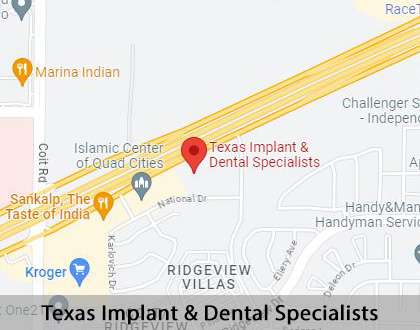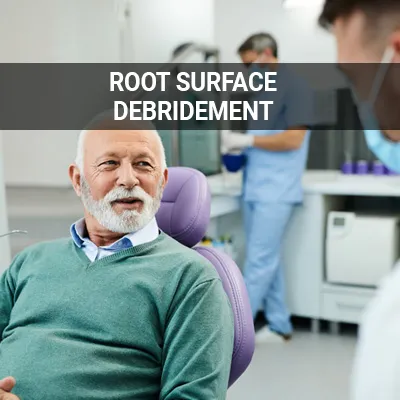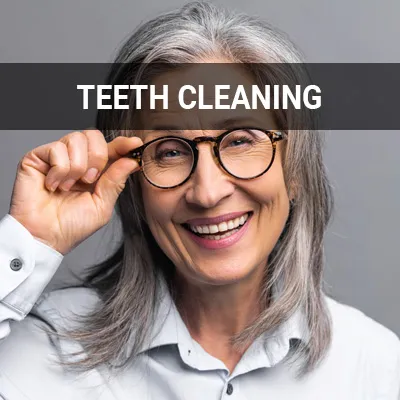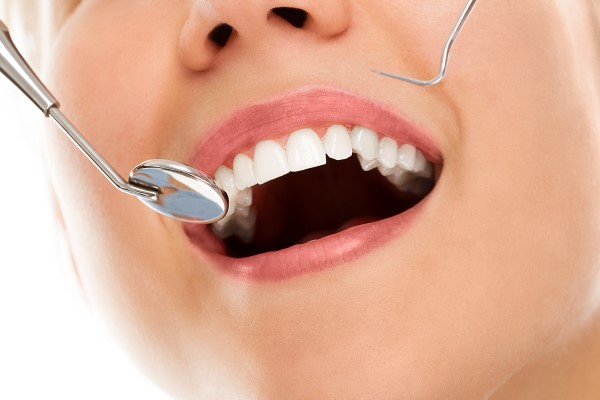Prophylaxis Plano, TX
Dental prophylaxis is a crucial part of preventive dental care. It can encompass a variety of services. Dental prophylaxis involves cleaning the teeth and inspecting the mouth.
Dental prophylaxis is available at Texas Implant & Dental Specialists in Plano and the surrounding area. Take every step you can to keep yourself safe. Call us today at (972) 535-6555 to schedule an appointment or learn more about our services.
Understanding Prophylaxis
A dental prophylaxis is a routine, preventive procedure in which the dentist examines the patient for any changes in their health and updates their medical history accordingly. Relevant changes to a patient's health record may include medications, new diagnoses, pregnancy, or other updates.
Since dental prophylaxis is a preventive procedure, it will also include an oral cancer screening via a physical and visual examination of the neck and mouth. Dental prophylaxis may include X-rays, periodontal probing, and ongoing oral care recommendations.
“Relevant changes to a patient’s health may include medications, new diagnoses, pregnancy, or other updates.”
Who Needs Prophylaxis
As a preventive procedure, dental prophylaxis can benefit virtually all patients. Preventive procedures such as prophylaxis help patients avoid cavities, enamel wear, gum disease, and more. By caring for one's oral health, patients can prevent various oral health issues from occurring or progressing further.
Most patients will need to undergo preventive dentistry procedures at least twice a year, though some patients may require more or fewer visits. It is crucial to remember that oral health is "a window to [one's] overall health," meaning that dental prophylaxis can also lower one's risk of several systemic diseases.
“Most patients will need to undergo preventive dentistry procedures at least twice a year, though some patients may require more or fewer visits.”
Benefits of Prophylaxis
The most obvious benefit of prophylaxis is that it lowers the patient's risk of developing tooth decay, gum disease, and other, more severe dental problems. In addition, it also helps promote good oral hygiene habits and allows the periodontist to identify any dental issues before they become problematic.
Prophylaxis also allows the periodontist to do a full exam of the mouth, neck, jaw, and other areas to identify any related problems. As such, prophylaxis often saves patients both time and money. By detecting and treating dental problems with prophylaxis, periodontists can help reduce the risk of systemic health conditions.
“By reducing dental problems with prophylaxis, periodontists can help reduce the risk of systemic health conditions.”
Check out what others are saying about our dental services on Yelp: Prophylaxis in Plano, TX
Common Prophylaxis Treatments
According to Colgate, a dental prophylaxis appointment may consist of X-rays and periodontal probing. X-rays allow the periodontist to discover potential oral health problems that are too physically minuscule to be seen by the naked eye. Most patients who receive X-rays get bite-wing X-rays of the molar and premolar teeth, while some also get X-rays of the anterior incisor teeth. Patients with excellent oral health who regularly see their periodontist may not need X-rays as often as those at risk for oral health issues. We use X-rays as one way to update a patient's medical history.
Once we have updated the patient's medical history, we will move onto a visual examination of their gum tissue and conduct a periodontal probing. A periodontal probing is the process of measuring the depth of the patient's gum tissue using a special device called a periodontal probe. We must measure the gum tissue to ensure that the patient's gums fit snugly around the teeth. Gums may pull away from the teeth and create pockets due to poor oral hygiene, age, or medical conditions. We will also inspect the teeth for any areas of potential tooth decay and perform a dental cleaning to remove tooth stains and clean between the teeth with floss.
“According to Colgate, a dental prophylaxis appointment may consist of X-rays and periodontal probing.”
Questions Answered on This Page
Q. What are some of the advantages of prophylaxis?
Q. What happens during a dental prophylaxis appointment?
Q. How can I take care of my teeth at home?
People Also Ask
Q. What happens during a root surface debridement?
Q. What are the advantages of a periodontal teeth cleaning?
Q. What is the difference between scaling and root planing?
Q. What is meant by a preventative treatment for periodontal disease?
At-Home Recommendations
According to the American Dental Association, there are several things that patients can do to take care of their teeth at home. These suggestions are based on data from clinical studies and systematic reviews. A periodontist can also give patients more personalized recommendations based on their unique needs and desires. By taking care of one's teeth at home, patients can optimize their oral health even further.
All patients should brush their teeth at least twice daily with fluoride toothpaste and floss at least once nightly. Eating a healthy diet low in sugar is also beneficial, as is keeping regular dental appointments. Patients with an increased risk of gum disease may also want to consider using an antimicrobial mouth rinse or toothpaste, while patients with an increased risk of dental caries may want to consider a fluoridated mouth rinse. Those who require extensive plaque removal may also want to consider an electric toothbrush. Other general recommendations involve drinking fluoridated water and tobacco cessation.
“According to the American Dental Association, there are several things that patients can do to take care of their teeth at home.”
Frequently Asked Questions
Q. How long does a dental prophylaxis appointment take?
A. It typically takes about an hour to complete a dental prophylaxis appointment. We will spend approximately 20 minutes scaling and polishing the teeth. The rest of the time, we will be carrying out various tasks, such as: taking X-rays, checking and recording your vitals, collecting data about your periodontal health, reviewing and updating your health history, oral hygiene recommendations, visual examination, fluoride treatment, and scheduling your next appointment.
Q. Is there a difference between plaque and calculus?
A. Yes. Plaque has not yet had the chance to harden and can thus be removed by brushing or flossing the teeth. If it is not removed, it hardens into calculus, also known as tartar. Calculus can only be removed by a professional.
Q. Will I still be a candidate for dental prophylaxis if I have accumulated a lot of tartar above and below the gums?
A. Those who have accumulated a lot of tartar below the gums are usually not suitable for a regular prophylaxis appointment. Instead, they are usually better suited to a more intensive treatment known as periodontal therapy. This is a deeper, more time-consuming cleaning than regular prophylaxis.
Q. What is the difference between regular dental prophylaxis and antibiotic prophylaxis?
A. Regular dental prophylaxis refers to a preventive dental procedure that involves cleaning the teeth. In comparison, antibiotic prophylaxis refers to the act of taking antibiotics before surgery or another procedure. We will let you know well in advance if antibiotic prophylaxis is necessary for any of your procedures.
Q. How can I prevent periodontal disease?
A. Untreated periodontal disease can have disastrous effects on one's oral and overall health, including diabetes complications, heart attacks, and more. Periodontal disease is also one of the main causes of tooth loss, which can lead to a bevy of other oral and overall health issues. Making regular dental prophylaxis appointments and keeping up with one's oral hygiene routine at home can help prevent periodontal disease.
Start Feeling Better – Visit Us Today
By visiting us as soon as possible, our team can help get you the professional treatment you need. Instead of waiting around and allowing the symptoms to get worse, we can provide you with treatment options.
Definitions
Call Us Today
With prophylaxis, patients can rest assured knowing their oral health is in tip-top shape. We at Texas Implant & Dental Specialists can help. Call us today at 972-535-6555 to schedule an appointment or learn more about our services.
Helpful Related Links
- American Academy of Periodontology (AAP). American Academy of Periodontology (AAP). 2023
- Center for Disease Control and Prevention (CDC), Periodontal Disease Page. Center for Disease Control and Prevention (CDC), Periodontal Disease Page. 2023
- WebMD, What Is a Periodontist?. WebMD, What Is a Periodontist?. 2023
About our business and website security
- Texas Implant & Dental Specialists was established in 2007.
- We accept the following payment methods: American Express, Cash, Check, Discover, MasterCard, and Visa
- We serve patients from the following counties: Collin County, Denton County and Dallas County
- We serve patients from the following cities: Plano, Frisco, Allen, McKinney, Garland, Richardson, Prosper, Wylie, Murphy, and Dallas
- Norton Safe Web. View Details
- Trend Micro Site Safety Center. View Details
Back to top of Prophylaxis










